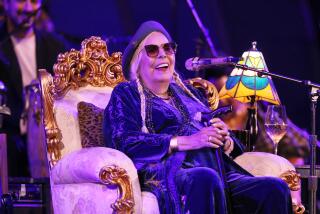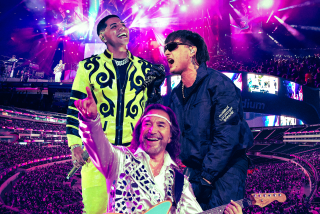Starting a Fire at the Box Office : Whatâs the secret of Joelâs new appeal? Look to the growing impact of his cross-generational attraction
Thanks to such hits as âJust the Way You Areâ and âAllentown,â Billy Joel has registered seven straight Top 10 albums. Yet heâs never been able to sell out more than two nights at an arena in the Los Angeles area.
However, Joel has sold out five nights--starting Saturday--at the 14,000-seat Los Angeles Sports Arena.
His current album, âStorm Front,â has sold 2 million copies--respectable, but not spectacular for someone of his stature.
So why the popularity explosion?
A Calendar survey of concert promoters and booking agents around the country suggests that Joelâs years of hit singles and consistently strong word-of-mouth about his flashy stage performances play a part in the escalation of ticket demand.
The most crucial element, however, appears to be that Joel has tapped into the increasingly important factor in pop music: cross-generational appeal.
There have been instances of this twin generation lure ever since mothers and teen-age daughters screamed together at Elvis Presleyâs shows in the early â70s in Las Vegas. The Grateful Dead also demonstrated early that it could draw from various age groups. But the number of artists who appeal to more than one age group has increased dramatically.
The key in Joelâs case is that he has held on to his longtime fans, most of whom are now in their 30s, while also tapping into the MTV generation with the hit single âWe Didnât Start the Fire.â Heâs getting the yuppies and the âpuppies.â
âTwo things are very important when you look at Billy,â Miami promoter Jack Boyle said. âHe puts on the best live show youâve ever seen, so anyone who ever saw him wants to see him again. And his hit with âWe Didnât Start the Fireâ brought him the under-25s.â
Joelâs agent, Dennis Arfa, agreed: â âWe Didnât Start the Fireâ reached a generation of school kids from five years old on up and that was a big deal.â
Joel is not alone in this regard. To varying degrees, Elton John, Phil Collins, Rod Stewart and Eric Clapton have also benefited from cross-generational appeal.
The twin generation effect is the latest wild card that promoters must bring into play when trying to measure the potential drawing power of pop attractions in a business where arena and stadium headliners in North America generated an estimated $670 million last year. Gone are the days when they could just rely on record sales to tell how many tickets an artist is going to sell in a given market.
âThe concert business right now is excellent,â said Brian Murphy, president of Avalon Attractions, Southern Californiaâs leading concert promoter, which is presenting the Joel concerts here.
âSince the first week of January, I donât think a weekend has gone by without at least one major arena show going on sale, and I canât think of one that hasnât done well. Billy Joel, Janet Jackson, Phil Collins--itâs staggering, the kind of business going on out there.
âWhatâs amazing to me,â he continued, âis itâs doing it with a (slow) record market thatâs not corresponding. I try to look at a correlation between album sales and ticket sales, but right now Iâm not seeing it that way, like it used to be a few years ago. God, I wish I knew the answer.â
For one major booking agent, the answer lies in lifestyle of the yuppie half of popâs twin generations.
âThe demographic of the country has changed dramatically,â said one agent, who asked not to be named for fear of alienating potential clients. âThe older 20s through early 40s demographic has increased tremendously and as those people grow older, they get less adventurous in what concerts they go see. The Billy Joel or Paul McCartney-type concert appeals to people who donât go out a lot, but their (shows are enough of) an event to get them out.â
Concurred Missy Worth, who books shows at the Universal Amphitheatre: âThe older baby boomers are not buying many records, but theyâll still go out and see the bands they love.â
âYoungâ bands--including the Cure, New Kids on the Block, Guns Nâ Roses and Depeche Mode--can do sensational business at the box-office, but the veterans are generally the safest concert attraction.
âWhose tickets have done well recently? The time-proven artists who deliver a great show, like Pink Floyd and Genesis,â said promoter Boyle. âThe price of concert tickets has gone up dramatically, and when (fans) put the money in, itâs not the new acts they want, but people who have proven over time they can deliver on stage.â
Statistics bear him out. The two biggest tours of 1989 were by the two bands with the longest history of active rock acts: the Rolling Stones and the Who. They grossed an estimated $98 million and $41.7 million, respectively. Add Paul McCartney, Rod Stewart and Tom Petty to the list, along with Pink Floyd and Genesis, and youâve got a roster dominated by arena veterans.
The top concert draws today donât even eally need new albums. Neil Diamond set the Forum record of 10 sold-out shows last year without having had a hit single since âIâm Aliveâ in 1983. Even acts with younger audiences can manage quite well on the road without regard to their records.
Even most of the so-called alternative attractions that have done well recently, such as the B-52âs and New Order, have relatively lengthy histories behind them.
The riskiest venture for a promoter is the new act. Even album sales comparable to Joelâs would rarely translate into the kind of concert action heâs creating.
âConcert promoting is not the seat-of-the-pants business it was 10 years ago when youâd listen to the radio and something would hit you and youâd say, âIâll book it!â,â said Avalonâs Brian Murphy.
âWe do audience surveys. We want to find out more about the concert-goers, the things they like and donât like. . . . And we call up every (major record store) in the area and ask for their top 20 sellers in order.
âThen we call each radio station in the community and ask their Top 20s. If youâre getting airplay but not selling albums, thereâs a danger. People who want to listen to but not buy it may not want to go see it.â
Same goes at the Universal, Worth said. âWe look at all the factors,â she said. âWe look at radio airplay, which radio station itâs played on, how many units sold in the L.A. area, the demographics of the audience thatâs buying the record.â
But she added after a pause: âAnd then you go on a gut feeling.â
Among the gut feelings that proved recent successes for Worth were the B-52âs, who sold out four nights at the Universal, and New Order.
âWith the newer or alternative bands you donât know how theyâll do, but if theyâre big on (Los Angeles FM radio station) KROQ and in alternative sales at record stores, you can pretty much sell out their shows here,â she said. âWhen (the B-52âs) played here, they had a national Top 10 hit. But they didnât sell off that. They sold off the KROQ play.â
Alex Hodges, vice president in charge of concert booking for the Nederlander Organization, which in Southern California operates the Greek Theatre, the Pacific Amphitheatre and the Pantages Theatre, also likes to play some creative hunches, especially in package shows. Last year he was involved in putting together a tour co-billing guitar whizzes Stevie Ray Vaughan (whom Hodges also manages) and Jeff Beck.
âStevieâs record had been out and heâd already toured part of the country, and Jeffâs album wasnât out yet when we had to sell the show and make it work,â Hodges said, admitting that even he had some doubts about the packageâs drawing power, hoping for perhaps 8,500 in Los Angeles. But when the show sold 14,000 tickets at the Sports Arena, it was viewed as a tremendous success. Scaled down expectations are the rule today, even with the biggest events.
âThere were doubters even for McCartney and for how many stadium shows the Stones could do,â Hodges said. âNow people say, âMcCartney, thatâs great!â But at the time no one really knew how well heâd do. And I knew Billy Joel would be a success, but I donât know if I could have gauged how many nights he could do here.â
But one byproduct of all this success may be that expectations are being scaled up.
âThe Stones and McCartney probably regenerated people into going out to concerts,â Hodges said. âAnd the New Kids on the Block (the one huge concert success among newer acts) have stimulated a new audience in big, big, big numbers.â
But New Kids aside, the future of the concert business is now on the cusp between generations, says Tom Ross, head of the concerts division of Creative Artists Agency, which numbers Jackson, Madonna, Diamond and Clapton among its clients.
âWe weeded out a lot of the older acts that arenât great performers or singers,â he said. âThe ones that continue are great acts. Now itâs up to the younger ones to prove they are too, and unfortunately itâs the case that there arenât as many great performing acts as studio acts.â
Billy Joelâs agent, Dennis Arfa, is looking forward to the flowering of the baby boomersâ children, whom he likes to call baby bloomers .
âI think the baby-bloom generation will want to have its own heroes,â he said. âSome of the true superstars from the earlier generations will sustain, but weâre still living in the â70s, â80s and even late â60s, under the wing of the Beatles. But the next generation has to get out from under that. Right now the concert business is healthy for superstars, but as time goes on weâll realize how many stars there are not .â
More to Read
The biggest entertainment stories
Get our big stories about Hollywood, film, television, music, arts, culture and more right in your inbox as soon as they publish.
You may occasionally receive promotional content from the Los Angeles Times.










